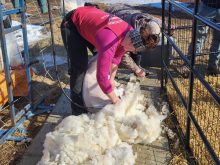A shaky Asian economy has become an opportunity for Canadian beef exporters.
The Asian beef industry remains in the doldrums, even though an improving economy has seen beef consumption remain stable or improve.
As a result, many countries are filling the gap with imported beef.
“They are still eating roughly the same amount, but their domestic industry is showing a decline,” said Canada Beef Export Federation chair Larry Sears.
“Canada has been very opportunistic and filled the gap.”
The federation has seen export sales to overseas markets make steady gains since 1990, when the group was formed by industry members.
Read Also

Charges laid after cattle theft
Saskatchewan RCMP lay two charges against a man after six cattle went missing.
Canadian beef exports are 12 times larger than in 1990. Nearly half a million cattle are processed in Canada for overseas markets and exports are increasing faster than competitors such as the United States and Australia.
Increased exports to new markets have helped shift the dependence on the American market. Canada continues to export about 50 percent of its total beef production, but last year 76 percent went to the U.S., down considerably from several years ago when 90 percent of Canadian beef went stateside.
Sears wants to see U.S.-bound exports shrink to less than 60 percent so Canada is even less dependent on a single market.
Japan remains one of Canada’s best clients.
Japanese beef imports carry a large tariff of 38.5 percent and the economy is still shaky. However, the retail and restaurant sectors continue to buy imported beef.
This year the Japanese are expected to import just over one million tonnes of beef and veal. The U.S. and Australia remain primary suppliers.
Canada now sells more beef to Japan than New Zealand – 18,500 tonnes compared to New Zealand’s 15,000 tonnes. Canada is expected to continue to make gains while the U.S. may fall back as it requires more beef for its domestic needs.
South Korean beef consumption has doubled in 10 years to about eight kilograms per person, but domestic production has been unable to meet demand.
It is projected that South Korea will import 217,000 tonnes of imported beef and veal. Canada hopes to provide about 18,500 tonnes compared to larger suppliers like the U.S., which sold the Koreans 121,000 tonnes. Australia shipped 63,000 tonnes.
Taiwan imports about 64,000 tonnes, with more than half of that coming from Australia. Canada provided about 2,500 tonnes and the Americans sold 13,000 tonnes.
Hong Kong is another buyer looking to Japan and North America for beef to fill demand in the hospitality trade.
Restaurants and hotels want high quality beef. However, representatives told the beef federation that Canada AAA has less marbling than USDA Choice. They prefer abundant marbling.
Figures for mainland China are difficult to obtain. Beef is not historically eaten in large amounts, but exports are expected to expand.
Mexico is another target market. It is a large beef producer, but infrastructure problems make it difficult to move meat around the country. It is expected Mexico will import nearly 260,000 tonnes of beef this year. Beef consumption is highly dependent on the economy and during times of recession, people eat chicken.
While Canadian exports to Mexico have shown substantial growth since 1990 – from 475 tonnes to 27,000 in 10 years – the U.S. remains the major supplier at 225,000 tonnes.

















